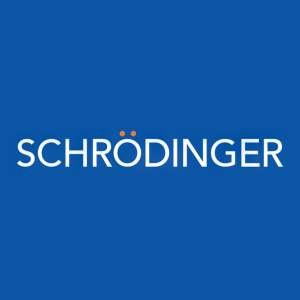Schrödinger to Present Preclinical Data at AACR Annual Meeting
Presentations include preclinical data on Wee1/Myt1 inhibitor SGR-3515 and SOS1 inhibitor SGR-4174
The SGR-3515 presentation will include data demonstrating that an optimized, intermittent dosing schedule of SGR-3515 resulted in an improved therapeutic index in preclinical oncology models. Preclinical data also showed that SGR-3515 has a differentiated profile supporting continued development as a potential therapy for patients with advanced solid tumors. A Phase 1 clinical trial in this patient population is ongoing, and Schrödinger expects to report initial clinical data from the trial in the second half of 2025.
Data will also be presented on the development of a machine learning model that predicts the response to drug combinations between Wee1 and other drugs in a large group of cell line models in selected cancer types. Additionally, the model identified several compounds as synergistic with Wee1 in new cancer settings which may be of future interest.
The SGR-4174 presentation will include data characterizing SGR-4174 in preclinical oncology models. The SOS1 protein plays a critical role in the activation and regulation of the KRAS gene. Inhibition of SOS1 is considered a potential therapeutic combination strategy for the treatment of KRAS-driven cancers. Preclinical data suggest SGR-4174 has a differentiated profile and support its continued development as a potential therapy for patients with KRAS mutant cancers and in rare diseases arising from KRAS pathway mutations. This is the first preclinical data presentation for SGR-4174.
Details of the data presentations are as follows:
Presentation Title: Optimization of therapeutic index of SGR-3515, a first-in-class Wee1/Myt1 inhibitor through intermittent dosing for monotherapy and combination with chemotherapy in xenograft tumor models
Abstract Number: #3025
Presentation Date and Time: Monday, April 28, 2025, 2-5PM CST (3-6PM ET)
Location: Poster Section 20
Session Title: Kinase and Phosphatase Inhibitors 2
Presentation Title: Machine learning-based combination prediction for Wee1 inhibitor
Abstract Number: #3660
Presentation Date and Time: Monday, April 28, 2025, 2-5PM CST (3-6PM ET)
Location: Poster Section 45
Session Title: Artificial Intelligence and Machine Learning for Therapeutic Election and Discovery
Presentation Title: Preclinical characterization of SGR-4174, a potent and selective SOS1 inhibitor for the treatment of pan KRAS mutant cancers in combination with KRAS pathway inhibitors
Abstract Number: #4376
Presentation Date and Time: Tuesday, April 29, 2025, 9AM-12PM CST (10AM-1PM ET)
Location: Poster Section 21
Session Title: RAS Inhibitors
About Schrödinger
Schrödinger is transforming molecular discovery with its computational platform, which enables the discovery of novel, highly optimized molecules for drug development and materials design. Schrödinger’s software platform is built on more than 30 years of R&D investment and is licensed by biotechnology, pharmaceutical and industrial companies, and academic institutions around the world. Schrödinger also leverages the platform to advance a portfolio of collaborative and proprietary programs and is advancing three clinical-stage oncology programs. Founded in 1990, Schrödinger has approximately 900 employees operating from 15 locations globally. To learn more, visit www.schrodinger.com, follow us on LinkedIn and Instagram, or visit our blog, Extrapolations.com.
Cautionary Note Regarding Forward-Looking Statements
This press release contains forward-looking statements within the meaning of The Private Securities Litigation Reform Act of 1995 including, but not limited to those statements regarding the potential advantages of Schrödinger’s computational platform, the clinical potential and favorable properties of SGR-3515, its Wee1/Myt1 inhibitor, and SGR-4174, its SOS1 inhibitor, the potential for SGR-3515 to be used for the treatment of advanced solid tumors, the potential for SGR–4174 to be used for the treatment of KRAS-driven cancers, and the timing, progress, and results of clinical trials for its product candidates, including SGR-3515. Statements including words such as “aim,” “anticipate,” “believe,” “contemplate,” “continue,” “could,” “estimate,” “expect,” “goal,” “intend,” “may,” “might,” “plan,” “potential,” “predict,” “project,” “should,” “target,” “will,” “would” and statements in the future tense are forward-looking statements. These forward-looking statements reflect Schrödinger’s current views about its plans, intentions, expectations, strategies and prospects, which are based on the information currently available to the company and on assumptions the company has made. Actual results may differ materially from those described in these forward-looking statements and are subject to a variety of assumptions, uncertainties, risks and important factors that are beyond Schrödinger’s control, including the uncertainties inherent in drug development and commercialization, such as the conduct of research activities and the timing of and its ability to initiate and complete preclinical studies and clinical trials, whether results from preclinical and early clinical studies will be predictive of the results of later preclinical studies and clinical trials, uncertainties associated with the regulatory review of clinical trials and applications for marketing approvals and the ability to retain and hire key personnel on its business and other risks detailed under the caption “Risk Factors” and elsewhere in the company’s Securities and Exchange Commission filings and reports, including its Annual Report on Form 10-K for the fiscal year ended December 31, 2024, filed with the Securities and Exchange Commission on February 26, 2025, as well as future filings and reports by the company. Any forward-looking statements contained in this press release speak only as of the date hereof. Except as required by law, Schrödinger undertakes no duty or obligation to update any forward-looking statements contained in this press release as a result of new information, future events, changes in expectations or otherwise.
View source version on businesswire.com: https://www.businesswire.com/news/home/20250324582138/en/
Matthew Luchini (Investors)
matthew.luchini@schrodinger.com
917-719-0636
Allie Nicodemo (Media)
allie.nicodemo@schrodinger.com
617-356-2325
Source: Schrödinger







